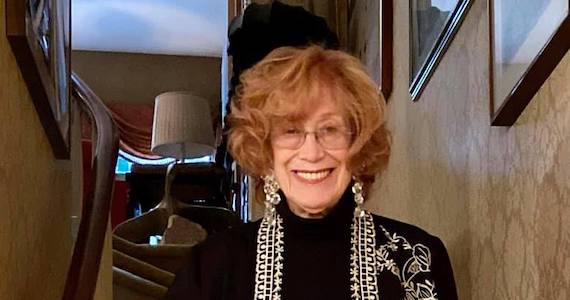Wilma Bulkin Siegel, MD WMC ’62, HD ’06: Helping Students Combine Creativity and Care

As Wilma Bulkin Siegel, MD WMC ’62, HD ’06 observes, “When I graduated medical school in the early 60s less than three percent graduating were female.” Although the odds were stacked against her, that didn’t prevent Dr. Bulkin Siegel from pursuing her dreams of becoming a doctor. A graduate of Woman’s Medical College (WMC), a predecessor institution of the Drexel University College of Medicine, Dr. Bulkin Siegel’s career has spanned not only an impressive track record as an oncologist and pioneer in hospice care, but also the ongoing exploration of how art plays an important part in well-being.
Dr. Bulkin Siegel recognized from a young age that she “had this dream of taking care of people and curing cancer.” WMC also saw this potential in her – telling her at her initial medical school interview that they believed she would become a leader in the field. Dr. Bulkin Siegel says of her decision to attend, “How could I not accept Woman’s Medical College, when they gave me all that confidence to go forward?”
Approximately halfway through her time at WMC, Dr. Bulkin Siegel could no longer afford to attend as her mother fell ill, and the resulting medical treatments required redirecting Dr. Bulkin Siegel’s tuition funds. In response to these challenges, Dr. Bulkin Siegel explains: “Woman’s Medical College gave me a scholarship so I could continue my dream of being a physician and caring for others… They didn’t want to give up on me. Of course, I want to honor it and pay back what was given to me.” She decided to do so by making a bequest gift to establish the Wilma Bulkin Siegel, MD Endowed Humanities Fund, which will expand upon arts programming for Drexel students aspiring to work in health-related professions.
Dr. Bulkin Siegel combines the two passions that have been at the forefront of her career: healing and the arts. She spent two decades as an oncologist and associate professor at Montefiore Medical Center and Albert Einstein College of Medicine, both in New York City, and she subsequently served as medical director and director of hospice care at Ritter-Scheuer Hospice, where she established one of the first hospices in the state of New York that cared for some of the first patients ever diagnosed with AIDS.
While determining how to address hospice patients’ pain, she pursued her lifelong interest in art as a way to de-stress. She began studying sculpture at The New School before eventually discovering her preferred medium of watercolor portraiture. Dr. Bulkin Siegel has since become a renowned artist, with works displayed in numerous galleries and private collections. She was awarded the Janice Palmer Award from the Society of Arts in Healthcare – the highest honor given for contributions to the field of arts in healthcare – in 2009, after playing a key role in developing arts programs for healthcare providers and patients at the University of Miami and Columbia University Medical Center.
Dr. Bulkin Siegel considers these two major threads of her career to be closely intertwined: “I am convinced that we need to develop both sides of the brain – the left where logic and analytical thinking resides and the right which provides intuition and creativity – in order to enhance our ability to communicate and to be more compassionate towards one another.”
She shared this guidance as a Drexel commencement speaker in 2006, when she received her honorary degree. After marching in the procession with then-President Constantine Papadakis, Dr. Bulkin Siegel took the podium onstage at the Kimmel Center to describe how “creativity is so important in everything we do.” Her late husband, Jesse Saunders Siegel, proudly watched on as she shared this vision with the graduating class of healthcare professionals.
Dr. Bulkin Siegel’s bequest gift will ensure that future generations of doctors, nurses and public health practitioners gain a well-rounded education which leverages art and the humanities to bring about “togetherness and respect of each other – so we can understand each other in a way that makes for positive in our world.”
Contact Us
215.895.2612
giving@drexel.edu
Mail your gift to
Drexel University
P.O. Box 8215
Philadelphia, PA 19101-9684
Drexel University Tax ID (EIN): 23‐1352630